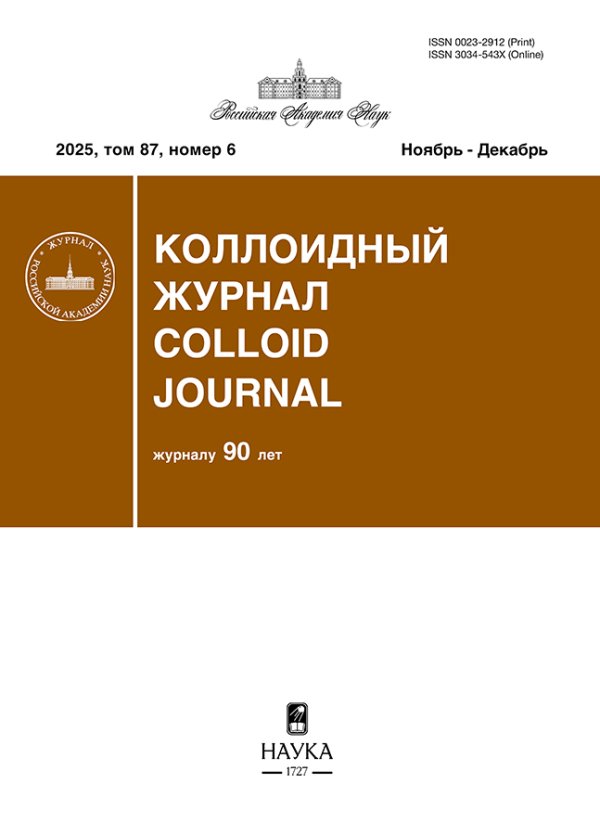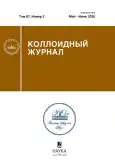Vol 87, No 3 (2025)
- Year: 2025
- Published: 15.05.2025
- Articles: 8
- URL: https://journal-vniispk.ru/0023-2912/issue/view/20222
Articles
Optically active films based on AOT-stabilized silver organosol
Abstract
The composite films based on silver organosol stabilised with anionic surfactant (AOT or bis(2-ethylhexyl)sodium sulphosuccinate) were obtained by the dip-coating method on polystyrene substrates. The films exhibit a surface plasmon resonance signal due to the presence of silver nanoparticles localised in the stabiliser layer. The film formation process is concomitant with the development of silver chain aggregates characterised by an interparticle distance that exceeds the particle diameters. The formation of aggregates does not induce alterations in the optical properties of nanoparticles. The obtained films exhibit a plasmonic signal and no plasmonic delocalisation. Due to varying the number of substrate immersions in the sol, it allows one to change the functional properties of the obtained films (viz., roughness (from 9 ± 2 to 25 ± 4 nm), wettability (from 36 ± 6 to 53 ± 9°), the morphology, the thickness (from 585 ± 13 to 831 ± 28 nm) and surface plasmon resonance signal).
Colloid Journal. 2025;87(3):173-186
 173-186
173-186


Application of machine learning for predicting phase behavior of interpolyelectrolyte complexes in water-salt media
Abstract
Water-salt solutions of interpolyelectrolyte complexes (IPEC) are a classic example of “smart” systems, the phase equilibrium in which is regulated by many factors associated with both the parameters of the polymer components and the physical and chemical properties of the environment. This paper presents a model created on the basis of machine learning for predicting the region of existence of water-soluble IPECs. An approach is proposed for independently taking into account the physicochemical properties of polyelectrolytes and the properties of the environment. The developed model is universal and can be used to predict the properties of multicomponent systems of various chemical natures.
Colloid Journal. 2025;87(3):187-201
 187-201
187-201


A study of cryostructuring of polymeric systems. 69. Physiomechanical and thermophysical properties of poly(vinyl alcohol) cryogels formed in the presence of nonprotonated and salt forms of basic α-amino acids
Abstract
By freezing at –20°C for 12 h and then defrosting by heating at a rate of 0.03°C/min of aqueous solutions of polyvinyl alcohol (PVA) without and with 0.1–0.5 mol/L additives of basic α-amino acids (arginine, histidine, lysine, ornithine) in non-protonated or salt forms, macroporous physical (non-covalent) cryogels were prepared and the effect of such additives on the physicochemical properties of the gel materials formed in this way was studied. It has been shown that in relation to the cryotropic gelation of PVA, additives of arginine, its hydrochloride, as well as histidine, exhibit chaotropic activity due to counteracting hydrogen bonding, thus leading to a decrease in the elasticity and heat resistance of the resultant cryogels, whereas additives of lysine, ornithine and their hydrochlorides, as well as histidine hydrochloride, due to the promotion of hydrogen bonding, act as kosmotropic agents, causing an increase in the compressive modulus of elasticity and an increase in the fusion temperature of the samples. The study of the kinetics of release of the amino acid additives used in the work showed that the release of hydrochlorides from the gel carrier into the external aqueous environment occurred somewhat more slowly than that of non-protonated forms, but in all cases without noticeable diffusion difficulties. Considering that such amino acids are used in cosmetology, the results obtained in this study suggest that PVA cryogels loaded with amino acid additives may be of practical interest in the development of carriers for cosmetics such as nourishing masks, coatings for problem areas of the skin, “patches”, etc.
Colloid Journal. 2025;87(3):202-222
 202-222
202-222


SUPERHYDROPHOBIC COATING BASED ON EP-140 EPOXY ENAMEL: A STUDY OF MECHANICAL ENDURANCE UNDER EXTERNAL ACTIONS
Abstract
In this study, the mechanical durability of a superhydrophobic coating fabricated on the basis of industrial epoxy enamel EP-140 was investigated. To achieve a superhydrophobic state, the applied coating was modified by pulsed laser texturing and fluorosilane chemisorption. The aim of the research was to evaluate the coating’s resistance to various mechanical loads typical for outdoor use: prolonged water contact, exposure to high-speed water jets, abrasive wear from falling sand, and multiple removals of adhesive tape. It was shown that the combined approach used in superhydrophobic treatment not only provides high water repellency but also significant resistance to degradation. Experiments revealed only a slight decrease in wetting characteristics, while the heterogeneous wetting regime was maintained, confirming that the coating retains its functionality even under extreme mechanical impacts. The obtained data indicate the promising application of the developed coating in industries that require a combination of high wear resistance and cost-effectiveness.
Colloid Journal. 2025;87(3):223-232
 223-232
223-232


PROCESSES OF STRUCTURE FORMATION IN AQUEOUS POLY(VINYL ALCOHOL) SOLUTIONS UNDER VACUUM ULTRAVIOLET IRRADIATION
Abstract
Upon irradiation of a 5% aqueous solution of polyvinyl alcohol with vacuum ultraviolet radiation (VUV) with a wavelength of 172 nm, it was found that a change in the structure of the solution occurs with the formation of crosslinked fragments of the polymer, despite the fact that the penetration depth of VUV into the solution is insignificant.
Colloid Journal. 2025;87(3):233-239
 233-239
233-239


TRANSFORMATION OF AQUEOUS METHYL METHACRYLATE SOLUTION INTO STABLE MONODISPERSE LATEX VIA POLYMERIZATION INITIATED BY HYDROQUINONE–POTASSIUM PERSULFATE SYSTEM
Abstract
The aim of this work was to identify the possibilities of synthesizing stable latex with a narrow particle distribution by homogeneous polymerization in an aqueous solution of methyl methacrylate. The polymerization of methyl methacrylate was first carried out under static conditions in an aqueous solution of the hydroquinone–potassium persulfate oxidation-reduction system. It was assumed that semiquinone anion radicals formed at the intermediate stage of hydroquinone oxidation can participate in the reactions of termination of growing radicals and by changing the molecular parameters of polymer molecules, affect the process of formation of latex particles. The article presents the results of the study of the colloidal parameters of the obtained latex, which show that the selected polymerization conditions allow reproducibly synthesizing monodisperse stable latex.
Colloid Journal. 2025;87(3):240-245
 240-245
240-245


Development of research on graphene-based nanofluids as heat carriers in direct absorption solar collectors
Abstract
This study considers the potential application of graphene nanofluid as a heat transfer medium in direct absorption solar collectors. It is found that graphene nanofluid has superior absorption ability in interaction with monochromatic (520 nm) and near infrared radiation. The use of graphene nanofluid as working fluid compared to distilled water in the direct absorption solar collector increased its efficiency even at very low concentration of dispersed phase particles. However, in order to apply graphene nanofluid in energy systems as a working fluid, some issues need to be addressed, primarily related to its low stability and thermal instability.
Colloid Journal. 2025;87(3):246-260
 246-260
246-260


Investigation of interfacial processes between oil and well stimulation fluids under different contact condition
Abstract
One of the practical challenges in the oil and gas industry is the formation of acid-oil emulsions and asphaltene sludge when well stimulation fluids come into contact with oil. The key to solving these problems lies in understanding the processes at the interface between oil and these agents, which is the focus of this study. The research investigates the processes occurring between sensitive oil and two types of stimulation fluids based on hydrochloric acid and ethylenediaminetetraacetic acid (EDTA) with and without the addition of a surfactant. Three methods are employed: simple mixing («bottle test»), simultaneous flow of fluids in a capillary, and simultaneous flow of fluids in a micromodel simulating a porous medium. Using simple mixing, it is shown that adding a surfactant to 15% hydrochloric acid can prevent sludge formation but does not prevent emulsion formation. Additionally, it is found that EDTA-based compositions with a neutral pH are compatible even with sensitive oil. Simultaneous flow experiments demonstrate the role of capillary walls in creating sludge and the cleaning ability of the chelating agent. Simultaneous flow in the micromodel highlights the distinctive features of hydrochloric acid compared to the chelate discrete flow, emulsion formation in the near-wall layer, and precipitate formation on pore walls. The results of this study can be useful both for further fundamental research into colloidal-chemical processes in oil reservoirs and for practical applications.
Colloid Journal. 2025;87(3):261-274
 261-274
261-274












